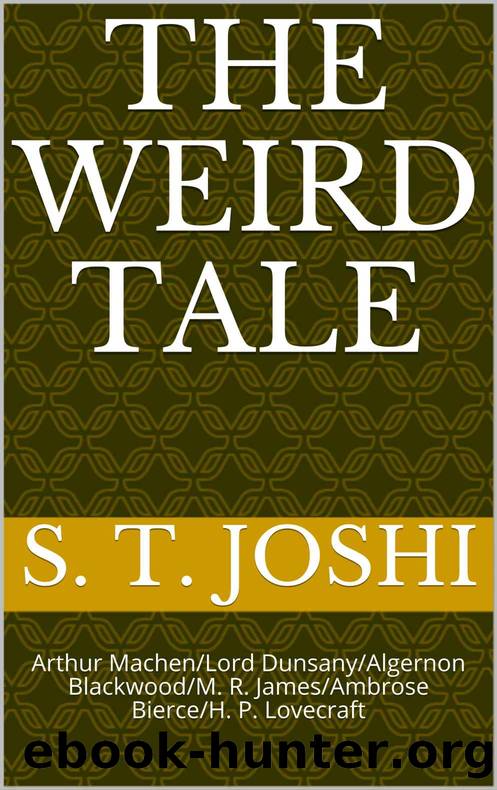The Weird Tale by S T Joshi

Author:S T Joshi
Language: eng
Format: azw3
Published: 2017-05-17T04:00:00+00:00
It is also quite obvious that Jamesâs inspiration began to flag very early on. If we concede that the eight tales in Ghost-Stories of an Antiquary (1904) are nearly perfect examples of the form, we must also add that the rest of Jamesâs work does little but ring increasingly feeble changes upon those tales. Jamesâs first collection is all that anyone need read of his work. It is particularly unfortunate to see James spin such an incredibly tedious tale as âMr. Humphreys and His Inheritanceâ (avowedly written to âfill upâ[121] his second volume); all the later tales are dogged by hints of this sort of prolixity.
As it is, perhaps James is rather more interesting as a critic and theorist of the form. We are now concerned with three documents: the preface to More Ghost Stories of an Antiquary (1911), the introduction to Ghosts and Marvels (1924), and the lengthy essay âSome Remarks on Ghost Storiesâ (1929). The first two are principally theoretical, and impeccable as far as they go; they prove that James had clear principles for ghost-story writing (Sullivan makes much too much of Jamesâs apparent coyness and indefiniteness in this regard) and that he followed them closely enough, with the exceptions noted above. The final essay is a fascinating history of the ghost storyâfascinating precisely because it is so bizarre. Admittedly, James seems to be narrowly restricting himself to the avowed âghost story,â so that perhaps it is understandable that such figures as Machen or Dunsany have no place in his account. But Jamesâs highly ambiguous stance toward Poe is of interest. The editor of Ghosts and Marvels had selected Poeâs âLigeiaâ for inclusion, and James was forced to comment upon it. His cautious remark, âEvidently in many peopleâs judgments it ranks as a classicâ scarcely conceals his distaste. âSome Remarks on Ghost Storiesâ is more ambivalent, as he speaks of âsome Americansâ (i.e., the pulp writers) who fancy that they âtread . . . in the steps of Edgar Allan Poe and Ambrose Bierce (himself sometimes unpardonable),â[122] but the hint of disapproval is strong. What offended James so much? Clearly it was the concentration on what he felt was the merely physically gruesome, as can be inferred in his slap at Bierce and also in his comment on E. F. Benson: âHe sins occasionally by stepping over the line of legitimate horridness.â[123] Certainly he has nothing good to say about the American pulp writers: âThe[y] are merely nauseating, and it is very easy to be nauseating.â[124] This is really an unprovoked attack, since the pulp writers never considered themselves âghost-story writersâ and should therefore not even have been mentioned in Jamesâs essay. I think Jamesâs squeamishness prevented him from appreciating the fact that there is a lot more to the work of Poe, Bierce, Machen, and Lovecraft than merely loathsome physical horror; Jamesâs idol Le Fanu can be just as revolting, but evidently his indirection appealed to James.
I have studied James here not because I have much
Download
This site does not store any files on its server. We only index and link to content provided by other sites. Please contact the content providers to delete copyright contents if any and email us, we'll remove relevant links or contents immediately.
Kathy Andrews Collection by Kathy Andrews(11839)
The remains of the day by Kazuo Ishiguro(9002)
Spare by Prince Harry The Duke of Sussex(5200)
Paper Towns by Green John(5194)
The Body: A Guide for Occupants by Bill Bryson(5100)
Industrial Automation from Scratch: A hands-on guide to using sensors, actuators, PLCs, HMIs, and SCADA to automate industrial processes by Olushola Akande(5063)
Machine Learning at Scale with H2O by Gregory Keys | David Whiting(4314)
Be in a Treehouse by Pete Nelson(4055)
Never by Ken Follett(3960)
Harry Potter and the Goblet Of Fire by J.K. Rowling(3864)
Goodbye Paradise(3812)
The Remains of the Day by Kazuo Ishiguro(3414)
Into Thin Air by Jon Krakauer(3402)
Fairy Tale by Stephen King(3401)
The Cellar by Natasha Preston(3347)
The Genius of Japanese Carpentry by Azby Brown(3310)
120 Days of Sodom by Marquis de Sade(3276)
Reminders of Him: A Novel by Colleen Hoover(3125)
Drawing Shortcuts: Developing Quick Drawing Skills Using Today's Technology by Leggitt Jim(3084)
